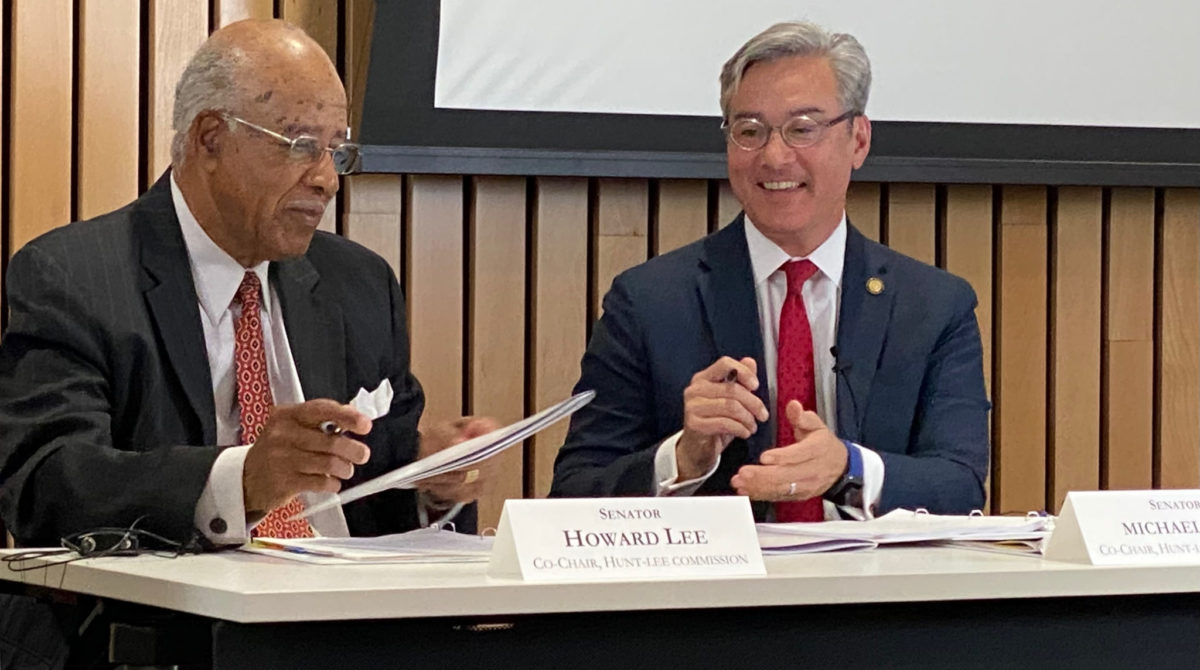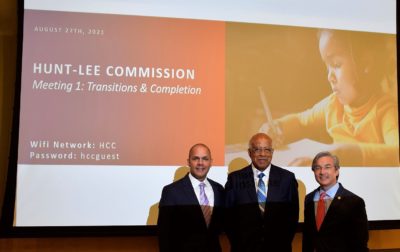
Share this story
- The Hunt-Lee Commission started last August and has worked ever since to find recommendations for improving education that both Republican and Democratic members could agree on.
- The bipartisan Hunt-Lee Commission released 16 recommendations for improving public education in North Carolina. Find out what they are.
The Hunt-Lee Commission released 16 recommendations Monday to help improve North Carolina public schools.
Convened by The Hunt Institute, the bipartisan group — made up of legislators, administrators, state leaders, and educators from across the political spectrum — endorsed priorities which include increasing availability of child care subsidies, helping students access higher education, and enabling more access to NC Pre-K.
“It was no small feat getting this impressive group of leaders together from the public and private sectors,” said commission chair emeritus and founder of The Hunt Institute, former Gov. Jim Hunt, in a press release. “The outcomes of this commission demonstrate how, when it comes to North Carolina’s students and education system, even within our diversity of backgrounds and beliefs we can indeed find common ground that advances our work.”
The commission was named for Hunt — who could not attend the press conference Monday — as well as for his co-chairs, former Sen. Howard Lee, a Democrat, and Sen. Michael Lee, R-New Hanover. The recommendations are grouped under three general headings. You can see the 16 recommendations grouped under their respective headings below:
Build On What We Have
- Strengthen our data information and sharing
- Model potential enhancements to our school finance system
- Increase the availability of child care subsidies
- Reduce barriers to access for NC Pre-K
- Incentivize excellent teachers to work in high-needs schools
- Expand the Advanced Teaching Roles pilot
- Grow the school leader pipeline
- Improve schools’ and districts’ ability to respond to student needs
Invite and Test New Ideas
- Identify opportunities to make early child education a financially viable career
- Incentivize providers to open more spaces for infant and toddler care
- Bridge student transitions from middle to high school
Implement Proven Solutions
- Expand home visiting programs
- Renew and sustain the state’s financial support for students pursuing two-year degrees
- Expand eligibility for in-state tuition
- Increase non-academic supports for postsecondary students
- Increase support for FAFSA completion
Launched in August 2021, the commission’s work has taken place during a critical time for the future of North Carolina education. As COVID-19 pandemic subsides and the education policy world takes stock of lessons learned and learning lost, key state leaders backed the commission, including House Speaker Tim Moore, R-Cleveland, Senate President Pro Tem Phil Berger, R-Rockingham, and Gov. Roy Cooper, a Democrat.
“There is much more to this commission than meets the eye. It’s the relationships that were built to create some of these recommendations,” said Sen. Michael Lee, adding later: “I think there’s an intangible benefit here that I would like everyone to recognize.”
Commission member Rep. Jon Hardister, R-Guilford, said that commission members focused on four broad areas: access, alignment, funding, and transitions.
He said many of the recommendations will require action from lawmakers, but others can be done by organizations and agencies without the need to change particular laws or policies.
Sen. Michael Lee brought up the example of the the Rowan-Salisbury School System, which has been granted renewal status by the General Assembly. This status allows its schools to operate with charter-like flexibility. But in the process of developing their strategy, he explained, district leaders discovered they didn’t actually need new flexibility to accomplish some of their goals — they just needed to think about how to operate differently.
State Board of Education Chair Eric Davis, a member of the commission, said that the work that will result from these recommendations is going to take a “sustained commitment” of at least 10 years.
“I’m confident that these and future recommendations will lead to better education laws and policies,” he said. “They’ll lead to better support for and more educators in our schools. And most importantly, they will lead to better academic outcomes for our students.”
Former Sen. Howard Lee said that in addition to the recommendations, the work of the commission to bridge their ideological differences and find common ground can make a big difference going forward.
“I’m thinking because of the committee’s work and the environment it created through its work, many of the barriers that we would expect to pop up won’t pop up,” he said.
Here is the full list of commission members:
- Governor James B. Hunt, Jr.; Chair Emeritus, Hunt-Lee Commission
- Howard Lee, Former State Senator, North Carolina General Assembly; Co-Chair, Hunt-Lee Commission
- Michael Lee, Senate District 9, North Carolina General Assembly; Co-Chair, Hunt-Lee Commission
- Gris Bailey, President & CEO, Latin American Chamber of Commerce
- Deanna Ballard, Senate District 45, North Carolina General Assembly
- Patricia Beier, Executive Director, Wayne Action Group for Economic Solvency, Inc.
- MC Belk Pilon, President and Board Chair, John M. Belk Endowment
- Alisha Byrd-Clark, Vice Chairwoman, Rowan-Salisbury School Board
- Ashton Clemmons, House District 57, North Carolina General Assembly
- Kisha Clemons, 2020 North Carolina Principal of the Year, Newton-Conover City Schools
- Gerry Cobb, Director, Pritzker Children’s Initiative, JB & MK Pritzker Family Foundation
- Geoff Coltrane, Senior Education Policy Advisor, Office of Governor Roy Cooper
- Amy Cubbage, President, North Carolina Partnership for Children
- Eric Davis, Chair, North Carolina State Board of Education
- Don Davis, Senate District 5, North Carolina General Assembly
- Jeffrey Elmore, House District 94, North Carolina General Assembly
- Dr. Charles Foust, Superintendent, New Hanover County Schools
- Dr. Anthony Graham, Provost, Winston-Salem State University
- Mo Green, Executive Director, Z. Smith Reynolds Foundation
- Dr. Ferrel Guillory, Professor of the Practice Emeritus, UNC Chapel Hill
- Peter Hans, President, The UNC System
- Jon Hardister, House District 59, North Carolina General Assembly
- John Herrera, Senior Vice President of Latino-Hispanic Affairs, Self-Help Credit Union
- Dr. Sam Houston, President & CEO, NC STEM Center
- Dr. Judith Kelley, Dean, Sanford School of Public Policy, Duke University
- Dr. Laura Leatherwood, President, Blue Ridge Community College
- Dr. Leslie Locklear, Program Coordinator, UNC Pembroke
- Susan Perry, Chief Deputy Secretary, NC Department of Health and Human Services
- Mark Robinson, Lieutenant Governor, North Carolina
- Gary Salamido, President & CEO, NC Chamber of Commerce
- Thomas Stith, President, North Carolina Community College System
- Maureen Stover, 2020 North Carolina Teacher of the Year, Cumberland County Schools
- Elaine Townsend Utin, Executive Director, LatinxEd
- Catherine Truitt, Superintendent of Public Instruction, North Carolina
- Brent Williams, 2021 North Carolina Superintendent of the Year, Lenoir County Schools
- Dr. Hope Williams, President, North Carolina Independent Colleges and Universities
You can read the full report here or see it below.
Editor’s Note: Ferrel Guillory, the vice chair of EducationNC, served on the commission.


